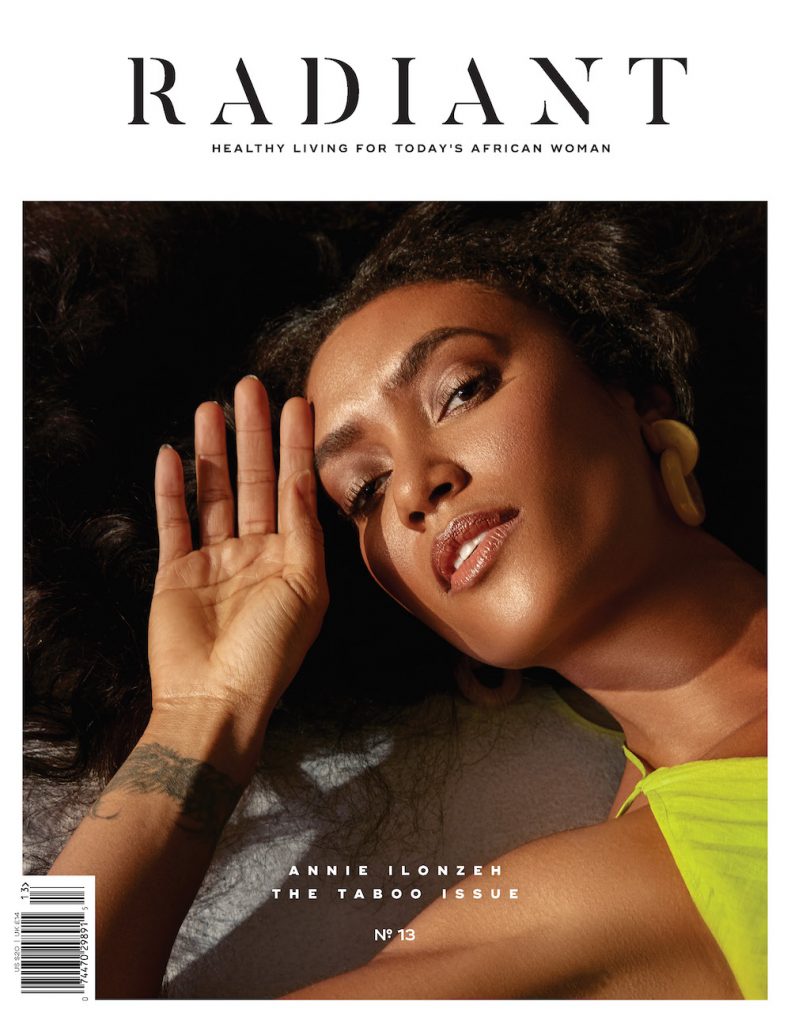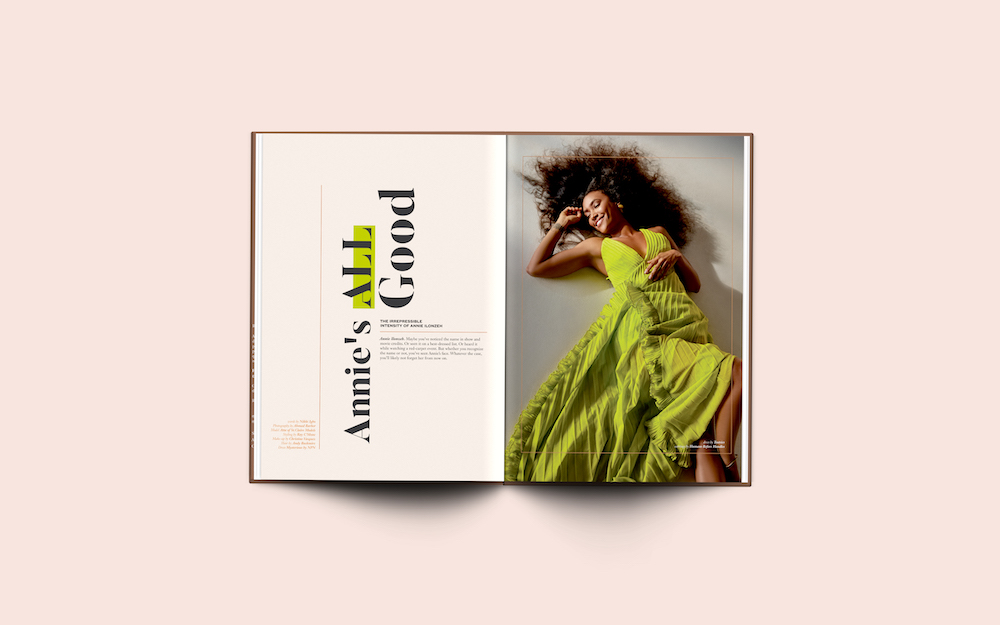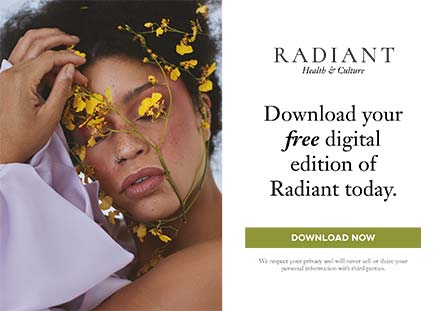The Taboo Issue, Radiant No.13 Editor’s Note
By Nnenna Kalu MakanjuolaPublished: July 30, 2019

New York City, 2006. I was walking down the street not too far from my apartment. I can’t recall now exactly where I was going, but I remember that I had just spent the previous night—and the wee hours of the morning—taking out my microbraids.
Now that the braids were out, I didn’t know what to do with my hair. The period between braids was always the most frustrating for me, as I wasn’t blessed with “good hair” (or so I thought then) and had never been able to style my noncompliant 4C tresses to save my life.
I had stopped perming my hair years before because it always turned out to be a colossal waste of time and money. A single morning run and the hair was done for; one afternoon of tubing on the lake or swimming at the pool and I’d only have the chemical burn scabs as evidence of having permed just days before.
But this natural hair life wasn’t doing me any favors either. My long, thick hair had a wild mind of its own.
While silently contemplating my hair-related frustrations, I walked past a beauty salon, and before I knew it, I was inside asking for a haircut. The stylist asked what type of cut I wanted. I told him I didn’t care: just take it all down and then we can talk about style afterward.
And that’s how I unceremoniously began my low-cut journey. I loved it and lived hairpily ever after.
Well, almost. After years of short fros, more braids, and traditional locs, I finally joined the sisterlocks gang last year. It’s a decision I’m happy with, though the early months proved tricky. My much shorter front locks kept unlocking from sweat with my fairly intense workout schedule, and I stressed out when I had to do an underwater body composition measurement shortly after installing my locs. Even now, with summer here I’m low-key timing my pool time close to my lock-retightening appointment.
The notion that hair is the number one impediment to black women engaging in cardio exercise, swimming or physical activity in general should come as no surprise. Even though we’ve been sold the Kool-Aid of natural hair as the be-all-end-all solution, naturalistas struggle with this dilemma as well. But the unseemly vanity of it all keeps us from acknowledging the larger implications.
So when I attended the 2019 TEDx Atlanta conference, I was beyond thrilled to hear Trish Miller (interview on page xx) give a riveting talk on child drownings as a public health issue and what we can do about it. Speaking from her perspective as an African American woman, Trish was able to shed light on the role our hair plays in keeping many of us from learning to swim. Still, talking openly about how our hair impacts our health has become its own modern-day taboo.
Taboos these days aren’t manifested in stonings or shunning, but in more subtle, insidious patterns. Public enough for community gossip, lamentation, and shaming, but never open enough to foster meaningful dialogue toward a collective resolution. We pride ourselves in having transcended the cultural biases of our parent’s generation, yet we still passively perpetuate them in silence.
Pregnant out of wedlock? Abomination!
Divorced? God forbid. It is not my portion!
Infertile? Tufiakwa! She must have had many abortions in her youth.
Three miscarriages in a row? Witch!
Meanwhile, all of these are everyday occurrences, even more common than unsuccessful people with talent. Yet we pretend they are rare events that should not be spoken of lest we risk unleashing their full force on society.
This pretense hasn’t served us well.
Our aim with issue 13, The Taboo Issue, is to start a conversation around cultural taboos both ancient and modern, and more important, to share stories of women bucking the trend so that others walking these paths can know they’re not alone.
We figured if we were going to mess around with number 13, be it lucky or unlucky, we’d better make it something to talk about! In addition to Trish Miller’s story of her near-drowning experience, you’ll get the straight dope on cannabis from Sheena Roberson and Dr. Lakisha Jenkins, learn the benefits of masturbation from the women of Afrosexology, and hear two powerful firsthand accounts of divorce from Eno Inwek and Dr. Toyin Falusi.
This issue also delves into the genesis of nude hosiery for black women with groundbreaking entrepreneur Ade Hassan, as well as topics including eating disorders in black women, plastic surgery as the last beauty taboo, the rise of genderless fashion, and more.

Topping it all off is our fabulous cover girl, actress Annie Ilonzeh, whose discipline and grit is out of this world and served up with a grace and charm that’s utterly refreshing. Her story will no doubt inspire you to take a chance on yourself.
In short, every page of this issue will be a great conversation starter. I hope you run wild with it.
To your health,
Radiant is available in Barnes & Noble stores and other retail outlets. Order your copy online (we ship worldwide!) or check our stockists for a store near you.
Like what you're reading? Sign up for our free newsletter and never miss a post! Plus get a FREE digital version of our Issue No.10 with sign up.

- Self Care: A Reflection On Inner Indulgence (Radiant No. 16 Editor’s Note) - July 28, 2021
- Motherhood: The Journey, A Look Inside Radiant No. 15 (Editor’s Note) - August 23, 2020
- The Rebirth Issue, Radiant No.14 Editor’s Note - November 16, 2019
- The Taboo Issue, Radiant No.13 Editor’s Note - July 30, 2019
- Editor’s Note: The Womanhood Issue, Radiant Issue No.12 - November 12, 2018
- Editor’s Note: The Survival Issue, Radiant Issue No.11 - June 18, 2018
- Editor’s Note: Radiant Issue No. 10 is Here (+ Sneak Peek Inside) - October 31, 2017
- The PSYCHE Issue: Our First Print Edition is Here! - January 24, 2017
- Editor’s Note: It’s Our 2nd Year Anniversary! - May 10, 2016
- Editor’s Note: A New Milestone for Radiant Health! - February 10, 2016












